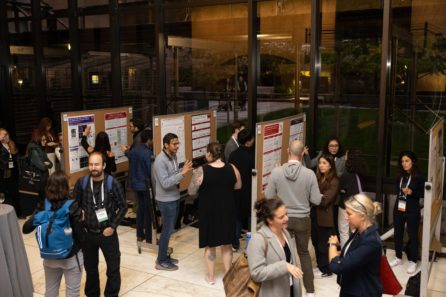New Frontiers in Regenerative Medicine: Highlights of the 2023 NYSCF Conference
NewsLast week we hosted the 18th annual NYSCF Conference at The Rockefeller University, gathering over 500 international participants from academia, industry, government and nonprofits to engage with the latest translational stem cell research. The meeting, held annually since NYSCF’s inception, served to continue our late founding CEO Susan L. Solomon’s vision of a forum for top minds in the field to innovate and collaborate towards addressing the unmet needs of patients.
The conference featured 26 inspiring single-track talks covering subjects such as advanced organoid models, neurodegenerative diseases, cancer, autoimmunity, and cell therapies; two interactive panel discussions exploring critical topics in drug discovery using stem cell models and the need to diversify stem cell biobanks to foster health equity; and two keynote lectures by stem cell pioneers including the first Susan L. Solomon Memorial Keynote Address.
We were also proud to announce the 2023 class of NYSCF – Robertson Stem Cell Investigators during the conference, welcoming three outstanding researchers into the NYSCF Innovator Community; and hosted the largest poster session to date, reflective of a record number of abstracts submitted this year by early career scientists eager to present at our meeting. Read on for highlights!
Keynote Addresses: Advancements in Reproductive Health and Blood Cancer Research
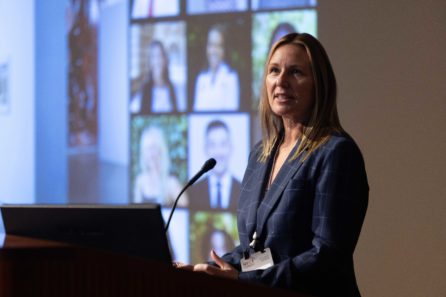
The conference’s first keynote was delivered by reproductive science research pioneer Amander Clark, PhD, inaugural Director of the UCLA Center for Reproductive Science and President of the International Society for Stem Cell Research. Professor Clark took the audience on a trip down memory lane recounting the tremendous progress in stem cell science over the last 20 years, highlighting both technological developments as well as societal and political changes – some of which she played key roles in – that have been essential for pluripotent stem cell-based research to prosper. She also shared how her lab is using human pluripotent stem cells to model the formation of germline cells in the embryo, and emphasized the enormous potential that emerging stem cell-derived embryo models hold for unraveling the mysteries of human infertility.
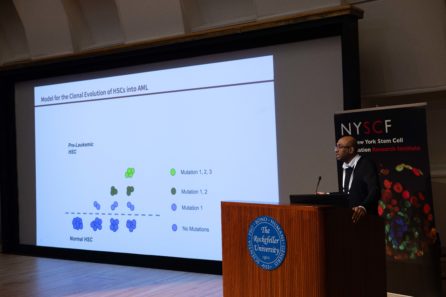
Cancer immunotherapy innovator and NYSCF – Robertson Stem Cell Investigator Alumnus Ravi Majeti, MD, PhD, of Stanford University, delivered the Inaugural Susan L. Solomon Memorial Keynote Address, detailing his efforts to therapeutically target pre-leukemic stem cells through uncovering their mutation-specific vulnerabilities, as well as novel approaches to cancer vaccination using myeloid cellular reprogramming.
Fostering Health Equity and Revolutionizing Drug Discovery with Stem Cell Models
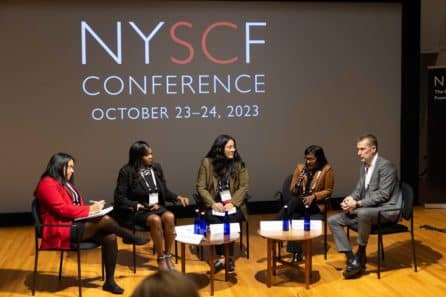
Currently, most stem cell lines used in research are derived from white, European populations, introducing a huge bias in our knowledge of human biology and disease, which contributes to the racial health disparities that already exist in clinical outcomes – e.g. Indigenous populations and black people are more than twice as likely as white people to die of diabetes.
As part of our annual spotlight on Diversity, Equity, Inclusion, and Belonging (DEIB) in STEM, we hosted a panel discussion with leading DEIB advocates to explore the challenges, current initiatives, and society-wide benefits of diversifying stem cell biobanks. Panelists Ruwanthi Gunawardane, PhD (Allen Institute for Cell Science), John M. Greally, DMed, PhD, FACMG (Albert Einstein College of Medicine), Krystal Tsosie, PhD, MPH, MA (Arizona State University), and Teresa Wright-Johnson (Patient Advocate) emphasized the great potential for discovery by including ethnic minorities in research, the responsibility of scientists to rebuild trust through dedicated engagement with marginalized communities, and the value of humanizing our research through remembering the patients behind our cells and datasets.
“The pillars of trust and cultural competency are essential for us as scientists to effectively integrate into biomedical research the communities that have been marginalized by it,” said Raeka Aiyar, PhD, NYSCF’s Vice President of Scientific Outreach and DEIB, who moderated the discussion.
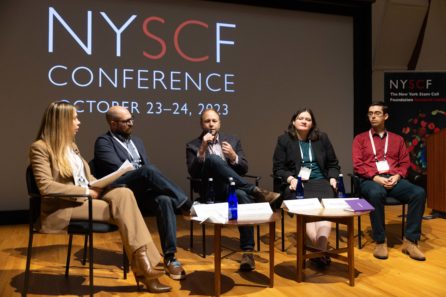
A second panel discussion explored another area of great momentum in our field: the growing opportunity to accelerate drug discovery offered by converging advances in stem cell models of disease, artificial intelligence and high-resolution molecular and cellular readouts. Academic and industry leaders including Tim Ahfeldt, PhD (Recursion Pharmaceuticals), Beth Cimini, PhD (Broad Institute), Daniel Paull, PhD (The NYSCF Research Institute), Daniel Ramos, PhD (National Institute on Aging), and Christine Brideau (Deerfield Advancing Healthcare, who moderated the panel) highlighted the latest progress in combining population-scale cellular models of human disease and machine learning-based approaches to identify new drugs and targets more effectively. Panelists also discussed strategies to circumvent the many challenges imposed by large, high-dimensional datasets, such as teasing out biological signal from technical noise, as well as maximizing their accessibility and usability for the broad research community.
Scientific Session Highlights
- Promising cell therapies in trials: in a session on emerging cell therapies, Viviane Tabar, MD (Memorial Sloan Kettering Cancer Center) presented the year 1 data from a first-in-human Phase I clinical trial of a dopamine neuron replacement therapy for Parkinson’s disease, demonstrating a good safety profile, early signs of engraftment and positive exploratory clinical outcomes in the 12 patients enrolled in the trial.
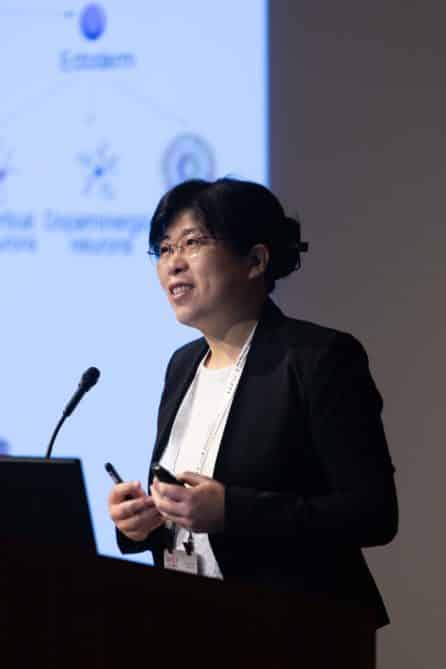
- Organoid models get even better: in a session on advanced organoid models, NYSCF – Robertson Stem Cell Investigator Alumna Shuibing Chen, PhD (Weill Cornell Medicine) shared her work on building organoid models to investigate the impact of infectious diseases on different tissues, detailing how SARS-CoV-2 infection leads to loss of beta cell identity in the pancreas.
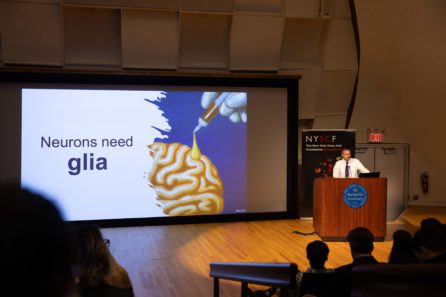
- Neuro research focuses on glia: in a session on neurodegenerative diseases, NYSCF – Robertson Stem Cell Investigator Alumnus Paul J. Tesar, DPhil (Case Western Reserve University School of Medicine) discussed his latest research on how he is leveraging stem cell-derived oligodendrocyte cultures to dissect how environmental factors present in our households (such as flame retardants and quaternary compounds) negatively impact oligodendrocyte function and brain physiology.
- Predictive cancer therapeutics becoming more tractable: in a session on tumor organoid models, Olivier Elemento, PhD (Weill Cornell Medicine; Director, Englander Institute for Precision Medicine) presented how his lab is improving organoid technology by creating increasingly complex, immuno-competent ex vivo tumor models that allow testing of hundreds of therapeutic combinations.
- Factoring in immune complexity: In a session on autoimmune diseases, NYSCF – Robertson Stem Cell Investigator Alumnus Deepta Bhattacharya, PhD (University of Arizona) shared the latest progress towards engineering a universal donor stem cell line to evade immune attack upon transplantation, including work done in collaboration with NYSCF’s Paula Alonso-Guallart.
We are very grateful to everyone who participated – the excitement for stem cell science, brilliance of early career researchers, and the spirit of community were palpable! We look forward to gathering again at The Rockefeller University on October 22-23, 2024 for the 19th Annual NYSCF Conference to continue fostering innovation and collaboration in translational stem cell research.
